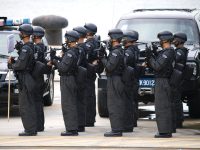Countdown to Execution – Should Chan and Sukumaran be Saved?

The two Australians convicted of drug trafficking ten years ago now face imminent execution in Indonesia.
Australians Andrew Chan and Myuran Sukumaran made the 700km journey to the execution island, where it is expected that their execution by firing squad is imminent.
Their journey began early in the morning of March 4, when they were taken from Kerobokan prison in handcuffs.
Outside prison, the brother of Andrew Chan was turned away when he tried to say goodbye one last time.
The convicted men were taken to an airport, which was in total lockdown in anticipation of their arrival.
Family members of both men had already made their way to Indonesia to say their last goodbyes and pray for a miracle.
Meanwhile, the men were flown to an airfield in Central Java and then taken to the island by ferry.
No date of execution has yet been announced – but the men must be given 72 hours notice by the Indonesian Attorney General.
Their appeals for presidential clemency have been rejected, and this is traditionally the last route of appeal that those facing execution have.
The men have spent the last ten years in Indonesian prisons, exhausting every avenue of appeal since they were convicted of trafficking 8.3kg of heroin all those years ago.
Australian politicians are horrified by the transportation of the duo to the execution island.
Tony Abbott and Julie Bishop have both said they have not given up hope for last minute clemency.
Bishop stated that she will continue to make representations to the Indonesian government, doing whatever she can to seek an eleventh-hour change of mind.
She has been trying to persuade the Indonesian Foreign Minister that showing clemency would be a display of strength that recognises the remarkable rehabilitation of the two men, who are desperate for their death sentences to be commuted to life imprisonment.
The Opposition stands united with the government, and Bill Shorten said that no one should give up hope.
Governments of other countries who have nationals facing the death penalty have also applied diplomatic pressure to Indonesia.
But Indonesia has vowed not to back down now – with Indonesia’s Attorney General Prasetyo saying “the sooner the better” in reference to the executions.
The President tells schoolchildren that 50 Indonesians die every day from drugs –justifying his hardline stance against drugs.
Rehabilitation not retribution:
Chan and Sukumaran are two of the most remarkable examples of rehabilitation.
Sukumaran had previously called his arrest “a blessing” because of the impact it had on his way of thinking.
He changed from someone who did not contribute to society, to a person committed to helping others.
Both men have expressed remorse for their actions and, incredibly, ran a drug rehabilitation program for fellow inmates inside prison.
The brother of Chan says that both men have learnt their lesson, and that, if the purpose of prison is reform, it has certainly been achieved in their cases.
The duo appears to demonstrate that rehabilitation is entirely possible if the desire is there.
Despite Bishop’s suggestion that Indonesia should acknowledge this and be merciful, the government wants to send a strong message that those who import drugs will be dealt with in the harshest possible way.
But the death penalty has never been an effective deterrent against drug importation or other crimes – numerous studies from around the world have found that zero-tolerance policies and harsh penalties do not stop crime.
If the executions go ahead, the deaths of Chan and Sukumaran would appear to be tragic and futile – doing nothing to promote rehabilitation or to stop the drug trade.






